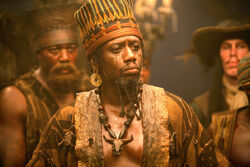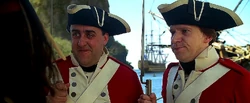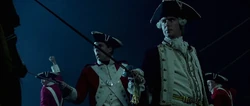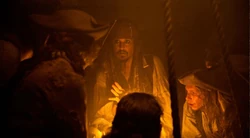
- "Seeing as there's two of us, a gentleman...would give us a pair of pistols."
"It'll be one pistol as before, and you can be the gentleman and shoot the lady and starve to death yourself." - ―Jack Sparrow and Hector Barbossa
A gentleman (plural gentlemen; abbreviated gent) was any man of good and courteous conduct. Originally, Gentleman was a title or rank denoting a man of a good family. Eventually, by definition, gentleman eventually saw use by members of the peerage, generally in reference to any man of good and courteous conduct. Some successful pirates and notorious adventurers were often called gentlemen of fortune. During the Age of Piracy, the title of "Gentleman" was most notably used by Gombo, a former slave turned pirate who took on the name of his former slave master, Gentleman Jocard, and later became the Pirate Lord of the Atlantic Ocean.
History

- "Gentlemen. Ladies. We must free Calypso."
- ―Hector Barbossa to the Pirate Lords of the Fourth Brethren Court
The infamous pirate captain Bartholomew Roberts dressed like the finest gentleman and drank only tea.[1] Fitzwilliam P. Dalton III, a young aristocrat who sailed with young Jack Sparrow, considered himself a gentleman.[2] Captain Edward Teague, the Pirate Lord of Madagascar as well as Keeper of the Code for the Brethren of the Coast, politely called his fellow pirate guests ladies and gentlemen.[3] Some successful pirates or notorious adventurers, like Captain Jack Sparrow, were consider a "gentleman of fortune" during the Golden Age of Piracy.[4]
While Jack Sparrow served as an merchant seaman for the East India Trading Company under his superior, Cutler Beckett, the slave girl Ayisha first saw Beckett and realized by the quality of his clothing, the fabric, and the tailoring that he was a wealthy English gentleman.[5] Before Captain Sparrow departed from Calabar with his merchant ship, the Wicked Wench, to search for the mythical island of Kerma and the treasure of Zerzura, Beckett cautiously asked him if he really intended to return, to which Sparrow replied that they had made a gentleman's agreement to split the treasure.[6] During the voyage Jack admitted to his First Mate Robert Greene that he thought Beckett was an upstanding gentleman when he first met him, but eventually came to think of him as just as bad as Boris Palachnik, the leader of the infamous rogue pirates.[7] A few months later, when Jack returned from his quest empty-handed, Beckett coerced him into taking a cargo of slaves to New Avalon, and gave him his word as a gentleman to never ask him to do that again.[8] When Jack Sparrow killed the rogue pirate Christophe-Julien de Rapièr, he refused to take the rogue's sword for himself because he considered it a gentleman's weapon not suitable for a humble mariner like himself.[9]
The title of "Gentleman" was most notably used by Jocard,[10] the Pirate Lord of the Atlantic Ocean,[11] as well as an escaped slave who took the name of his former master.[12] Gentleman Jocard's original name before he became a former slave turned pirate was "Gombo" until he led a slave revolt in his master's plantation in Louisiana, which led to the death of the slaver Gentleman Jocard himself, the plantation burned, as well as the freedom of his fellow slaves. Gombo briefly joined Captain Jack Sparrow as a cook aboard the Black Pearl until the runaway slave reunited with a crew of escaped slaves aboard the Ranger, taking his former master's name as the one and only Gentleman Jocard.[13][14]

Shortly before Captain James Norrington was promoted to commodore of the British Royal Navy, Governor Weatherby Swann considered Norrington a fine gentleman to Elizabeth Swann.[15] After the battle of Isla de Muerta, Commodore Norrington called the HMS Dauntless crew gentlemen after retaking the ship from cursed pirates.[16] Mr. Mercer was an undistinguished-looking gentleman under the employ of Lord Cutler Beckett of the East India Trading Company.[17] During the war between EITC and the Fourth Brethren Court, when giving a speech to the crew of the Black Pearl prior to the battle, Elizabeth called them gentlemen before giving them the order to hoist the colors.[10] During the quest for the Fountain of Youth, Blackbeard referred to the crew of the Queen Anne's Revenge as gentlemen during Jack Sparrow's attempted mutiny. Blackbeard later called Philip Swift "a man formerly of faith" due to the young missionary believing Blackbeard's soul could not be saved.[18]

Captain Jack Sparrow referred to his crews or other notable individuals as gentlemen. Jack once referred to Mullroy and Murtogg, two guards in the Royal Marines, as two upstanding gentlemen.[16] As he held Elizabeth Swann hostage, Sparrow called Commodore Norrington's men gentlemen prior to his attempted escape.[15] When the pirates Koehler and Twigg commented that Jack's fortunes hadn't improved since they marooned Sparrow on a desert island, their former captain advised the gentlemen to worry about their own fortunes.[16] Jack referred to his crew as gentlemen when questions arose about a drawing of a key.[4] While stuck in Davy Jones' Locker, Jack Sparrow referred to multiple hallucinations of himself as gentlemen.[10] When Angelica insinuated that she left him in their past romance, Sparrow replied, "A gentleman allows a lady to maintain her fictions." Jack repeatedly referred to his crew of mutineers as gentlemen when discussing the topic of mutiny aboard the Revenge.[18] After the escape from Saint Martin, Jack Sparrow addressed the Dying Gull crew as gentlemen.[19]

Hector Barbossa was equally as respectful to his own associates, including members of his crew. With an elegantly engraved flintlock pistol, which he won when a Spanish pirate challenged him to a duel, Barbossa dealt out death like a gentleman.[20][11] Captain Barbossa referred to his cursed crewmen as "gentlemen" and "gents" while attempting to lift the Aztec curse.[16] During the Fourth Brethren Court, Barbossa referred to most of the Pirate Lords and other attendees as gentlemen, and ladies due to two of the Lords being women.[10] When he served as a privateer in the employ of King George II, Barbossa referred to members of the Royal Guard and the HMS Providence crew as gentlemen.[18] Shortly before marooning Jack Sparrow again, this time with Elizabeth, despite the pirate suggesting a gentleman would give them two pistols, Barbossa suggested Jack be the gentleman in shooting Elizabeth and "starve to death" by himself.[16]
Behind the scenes
- "Right, then. Gentlemen, a man's first duty is less to his office than his own honor, and that he cannot perform if deceived."
- ―Jack Sparrow
The term "gentlemen" first appears in the souvenir book for Walt Disney's Pirates of the Caribbean.[1] As a term of address, "gentleman" first appeared in Irene Trimble's junior novelization for the 2003 film Pirates of the Caribbean: The Curse of the Black Pearl,[15] with "gents" first appearing in the final cut of the film.[16] In the 2006 German The Curse of the Black Pearl novelization, when James Norrington and his soldiers find the knocked out Jack Sparrow in John Brown's blacksmith shop Norrington says "Gentlemen, I'm sure we'll never forget the day Captain Jack Sparrow almost escaped."[21] When Jack Sparrow and Will Turner board the HMS Dauntless Jack addresses the few crewmembers onboard as "Herren" (Gentlemen).[22] According to Geoffrey Rush, Captain Hector Barbossa had earnest desires to be a gentleman of the sea.[23][24] The title "Gentleman" was first mentioned with the Pirate Lord Gentleman Jocard in the 2007 reference book Pirates of the Caribbean: The Complete Visual Guide.[11]
From screenplay to screen
In Ted Elliott and Terry Rossio's early screenplay draft for The Curse of the Black Pearl, rather than Captain Barbossa as in the final cut of the film,[16] it was Pintel who cut Elizabeth Swann's hand during the ritual in the cave, and when she looked surprised, he said they were all gentlemen there, right and proper.[25]
In Ted Elliott and Terry Rossio's screenplay for Pirates of the Caribbean: At World's End, unlike the final cut of the film,[10] Elizabeth Swann does not refer to the crew of the Black Pearl as "gentlemen" before giving the order to hoist the colors.[26]
In Ted Elliott and Terry Rossio's screenplay for Pirates of the Caribbean: On Stranger Tides, prior to the mutiny on the Queen Anne's Revenge, Jack Sparrow calls the Queen Anne's Revenge crew "Gentlemen" and tells them that a man's first duty is less to his office than his own honor, and that he cannot perform if deceived. Unlike the final cut of the film,[18] Hector Barbossa does not call the Providence crew as "gentlemen" before they sail for Whitecap Bay, and Blackbeard does not call his crew "gentlemen" as he beheld "a man formerly of faith" Philip Swift.[27]
In Terry Rossio's screenplay for Pirates of the Caribbean: Dead Men Tell No Tales, Admiral John Benbow referred to his crew as "gentlemen" before they sail for Fort San Cristobal. In what was intended to be the post-credit scene, Hector Barbossa tells the assembled crew members "The topic is mutiny, gentlemen. Mutiny most foul," which was likely intended as an allusion or callback to Jack Sparrow's mutiny in On Stranger Tides,[18] as Barbossa now plots to take Sparrow's life.[28]
Appearances
- Jack Sparrow: The Pirate Chase
- Jack Sparrow: The Sword of Cortés
- Jack Sparrow: The Age of Bronze
- Jack Sparrow: The Timekeeper
- Jack Sparrow: Dance of the Hours
- The Price of Freedom
- Legends of the Brethren Court: The Caribbean
- Pirates of the Caribbean: The Curse of the Black Pearl (First identified as gent)
- Pirates of the Caribbean: The Curse of the Black Pearl (2003 junior novelization) (First appearance) (First identified as gentleman)
- Pirates of the Caribbean: The Curse of the Black Pearl (2006 junior novelization)
- Fluch der Karibik
- Mother of Water
- Revenge of the Pirates!
- Pirates of the Caribbean: Dead Man's Chest (junior novelization)
- Pirates of the Caribbean: At World's End
- Pirates of the Caribbean: On Stranger Tides
- The Brightest Star in the North: The Adventures of Carina Smyth
- Pirates of the Caribbean: Dead Men Tell No Tales
Sources
- Walt Disney's Pirates of the Caribbean: The Story of the Robust Adventure in Disneyland and Walt Disney World
- Pirates of the Caribbean: The Visual Guide
- Pirates of the Caribbean: The Complete Visual Guide
External links
Notes and references
- ↑ 1.0 1.1 Walt Disney's Pirates of the Caribbean: The Story of the Robust Adventure in Disneyland and Walt Disney World, p. 13
- ↑ Jack Sparrow: The Pirate Chase, p. 52
- ↑ The Price of Freedom, Chapter Two: Lady Esmeralda
- ↑ 4.0 4.1 Pirates of the Caribbean: Dead Man's Chest
- ↑ The Price of Freedom, Chapter Five: The Lost Princess
- ↑ The Price of Freedom, Chapter Nine: Ayisha
- ↑ The Price of Freedom, Chapter Fifteen: Kerma
- ↑ The Price of Freedom, Chapter Eighteen: Exodus
- ↑ The Price of Freedom, Chapter Seventeen: A Matter of Honor
- ↑ 10.0 10.1 10.2 10.3 10.4 Pirates of the Caribbean: At World's End
- ↑ 11.0 11.1 11.2 Pirates of the Caribbean: The Complete Visual Guide
- ↑ Pirates of the Caribbean: At World's End: "Inside the Brethren Court"
- ↑ Legends of the Brethren Court: The Caribbean, p. 227
- ↑ Legends of the Brethren Court: Wild Waters, p. 74
- ↑ 15.0 15.1 15.2 Pirates of the Caribbean: The Curse of the Black Pearl (2003 junior novelization)
- ↑ 16.0 16.1 16.2 16.3 16.4 16.5 16.6 Pirates of the Caribbean: The Curse of the Black Pearl
- ↑ Dead Man's Chest (junior novelization), p. 12
- ↑ 18.0 18.1 18.2 18.3 18.4 Pirates of the Caribbean: On Stranger Tides
- ↑ Pirates of the Caribbean: Dead Men Tell No Tales
- ↑ Pirates of the Caribbean: The Visual Guide
- ↑ Fluch der Karibik, p. 63
- ↑ Fluch der Karibik, p. 101
- ↑ Pirates of the Caribbean: The Curse of the Black Pearl: "Becoming Barbossa"
- ↑ Pirates of the Caribbean production notes, accessed Dec 9, 2006
- ↑ Wordplayer.com: PIRATES OF THE CARIBBEAN: THE CURSE OF THE BLACK PEARL by Ted Elliott & Terry Rossio
- ↑ Wordplayer.com: PIRATES OF THE CARIBBEAN: AT WORLD'S END by Ted Elliott & Terry Rossio
- ↑ Wordplayer.com: PIRATES OF THE CARIBBEAN: ON STRANGER TIDES by Ted Elliott & Terry Rossio
- ↑ Wordplayer.com: PIRATES OF THE CARIBBEAN: DEAD MEN TELL NO TALES by Terry Rossio